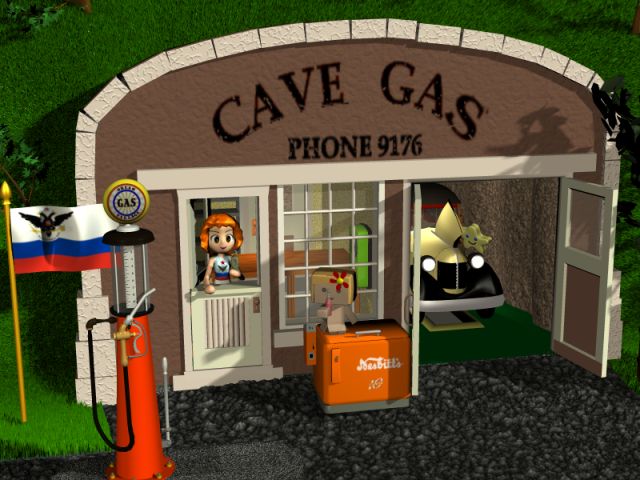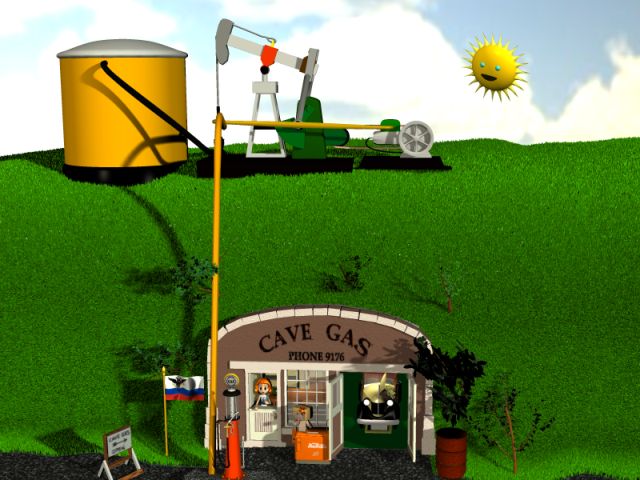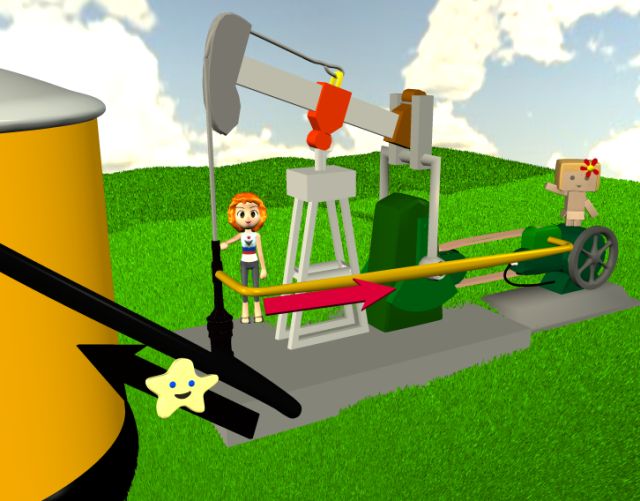Tuesday, July 05, 2016
Drip gas
Let's go back to Polistra's Cave Gas station, the location that represents Patient Things.
 Where would a Patient Gas Station get its gas? In the earliest days of cars and fuel, some gas stations got their gasoline directly from the well without a refinery.
Where would a Patient Gas Station get its gas? In the earliest days of cars and fuel, some gas stations got their gasoline directly from the well without a refinery.
 How? Crude isn't perfectly mixed. Like a jar of jelly, it has some light liquids mixed with heavy. The light liquids, more or less the same hydrocarbons used for proper gasoline, can be floated off and used in an engine. This direct usage didn't last long. As cars needed higher quantity and quality, proper refineries became mandatory.
Even when the light fraction isn't stored and transported, it's still available at the pumphead. With some Okla crudes this fraction runs the engine that turns the pump. A simple bit of plumbing lets the pump push the heavier stuff into the storage tank (black arrow, supervised by HappyStar) while the light liquid (red arrow, pointed by Polistra) rises up and flows into the carburetor of a drip-gas engine. (supervised by Danbo.)
How? Crude isn't perfectly mixed. Like a jar of jelly, it has some light liquids mixed with heavy. The light liquids, more or less the same hydrocarbons used for proper gasoline, can be floated off and used in an engine. This direct usage didn't last long. As cars needed higher quantity and quality, proper refineries became mandatory.
Even when the light fraction isn't stored and transported, it's still available at the pumphead. With some Okla crudes this fraction runs the engine that turns the pump. A simple bit of plumbing lets the pump push the heavier stuff into the storage tank (black arrow, supervised by HappyStar) while the light liquid (red arrow, pointed by Polistra) rises up and flows into the carburetor of a drip-gas engine. (supervised by Danbo.)
 The gasoline-like fraction varies in quantity and quality, so the drip gas engine doesn't have a reliable flow of good fuel. It's a hit and miss engine, popping every few turns and requiring a big flywheel to keep it going. It sounds like a badly-tuned car engine always on the verge of starting but never fully kicking over into smooth operation.
= = = = =
Metaphor.
Start with natural real value, do something to make it more convenient or more attractive or more useful, sell it. Cream off a fraction to keep the business going. = Capitalism.
Add a flywheel to allow for bad seasons or bad material. = Savings.
Drilling for stuff, bringing it up to where it can be used, selling it for more than what you paid. = Trading.
Drilling for money, paying a fraction to the source, flowing the money to borrowers, loaning it for more than you paid. = Banking.
The sharia system and the post-Stalin Soviet system were explicitly dripgassy, openly profit-based. Both systems depend on farmers, traders and manufacturers who add value, keep part of the increase to improve the business, and send some of it to the government. Because the government depends on profit, it encourages profit.
Our UK/US system never REQUIRED businesses to operate the dripgas way. Our constitutions don't say anything about it, and our governments don't DEPEND on profit for taxation. The original constitution wanted the feds to run primarily on tariffs, which would motivate the gov't to encourage trade above all; but Lincoln wiped that out along with the nation. Now the gov't runs on pure debt. Businesses still run and still generate profit, but the gov't doesn't need or want business, so it works FEROCIOUSLY HARD to discourage and kill real-value business, with appropriate results.
Conclusion: We've ended up with a bizarre and totally anti-natural system, the direct opposite of profit-based capitalism.
Banks no longer depend on crude deposits and loaned fuel, so they don't want any crude. They just fiddle with pure numbers. Corporations no longer need real stuff or real labor, no longer need to invent ways to add real value onto natural value. They just receive numbers from Janet or Bugsy, compute with the numbers, move digits in and out of the Magic Palace Of Mahwah, and write billion-dollar checks to CEOs. Magic.
The gasoline-like fraction varies in quantity and quality, so the drip gas engine doesn't have a reliable flow of good fuel. It's a hit and miss engine, popping every few turns and requiring a big flywheel to keep it going. It sounds like a badly-tuned car engine always on the verge of starting but never fully kicking over into smooth operation.
= = = = =
Metaphor.
Start with natural real value, do something to make it more convenient or more attractive or more useful, sell it. Cream off a fraction to keep the business going. = Capitalism.
Add a flywheel to allow for bad seasons or bad material. = Savings.
Drilling for stuff, bringing it up to where it can be used, selling it for more than what you paid. = Trading.
Drilling for money, paying a fraction to the source, flowing the money to borrowers, loaning it for more than you paid. = Banking.
The sharia system and the post-Stalin Soviet system were explicitly dripgassy, openly profit-based. Both systems depend on farmers, traders and manufacturers who add value, keep part of the increase to improve the business, and send some of it to the government. Because the government depends on profit, it encourages profit.
Our UK/US system never REQUIRED businesses to operate the dripgas way. Our constitutions don't say anything about it, and our governments don't DEPEND on profit for taxation. The original constitution wanted the feds to run primarily on tariffs, which would motivate the gov't to encourage trade above all; but Lincoln wiped that out along with the nation. Now the gov't runs on pure debt. Businesses still run and still generate profit, but the gov't doesn't need or want business, so it works FEROCIOUSLY HARD to discourage and kill real-value business, with appropriate results.
Conclusion: We've ended up with a bizarre and totally anti-natural system, the direct opposite of profit-based capitalism.
Banks no longer depend on crude deposits and loaned fuel, so they don't want any crude. They just fiddle with pure numbers. Corporations no longer need real stuff or real labor, no longer need to invent ways to add real value onto natural value. They just receive numbers from Janet or Bugsy, compute with the numbers, move digits in and out of the Magic Palace Of Mahwah, and write billion-dollar checks to CEOs. Magic.
 Where would a Patient Gas Station get its gas? In the earliest days of cars and fuel, some gas stations got their gasoline directly from the well without a refinery.
Where would a Patient Gas Station get its gas? In the earliest days of cars and fuel, some gas stations got their gasoline directly from the well without a refinery.
 How? Crude isn't perfectly mixed. Like a jar of jelly, it has some light liquids mixed with heavy. The light liquids, more or less the same hydrocarbons used for proper gasoline, can be floated off and used in an engine. This direct usage didn't last long. As cars needed higher quantity and quality, proper refineries became mandatory.
Even when the light fraction isn't stored and transported, it's still available at the pumphead. With some Okla crudes this fraction runs the engine that turns the pump. A simple bit of plumbing lets the pump push the heavier stuff into the storage tank (black arrow, supervised by HappyStar) while the light liquid (red arrow, pointed by Polistra) rises up and flows into the carburetor of a drip-gas engine. (supervised by Danbo.)
How? Crude isn't perfectly mixed. Like a jar of jelly, it has some light liquids mixed with heavy. The light liquids, more or less the same hydrocarbons used for proper gasoline, can be floated off and used in an engine. This direct usage didn't last long. As cars needed higher quantity and quality, proper refineries became mandatory.
Even when the light fraction isn't stored and transported, it's still available at the pumphead. With some Okla crudes this fraction runs the engine that turns the pump. A simple bit of plumbing lets the pump push the heavier stuff into the storage tank (black arrow, supervised by HappyStar) while the light liquid (red arrow, pointed by Polistra) rises up and flows into the carburetor of a drip-gas engine. (supervised by Danbo.)
 The gasoline-like fraction varies in quantity and quality, so the drip gas engine doesn't have a reliable flow of good fuel. It's a hit and miss engine, popping every few turns and requiring a big flywheel to keep it going. It sounds like a badly-tuned car engine always on the verge of starting but never fully kicking over into smooth operation.
= = = = =
Metaphor.
Start with natural real value, do something to make it more convenient or more attractive or more useful, sell it. Cream off a fraction to keep the business going. = Capitalism.
Add a flywheel to allow for bad seasons or bad material. = Savings.
Drilling for stuff, bringing it up to where it can be used, selling it for more than what you paid. = Trading.
Drilling for money, paying a fraction to the source, flowing the money to borrowers, loaning it for more than you paid. = Banking.
The sharia system and the post-Stalin Soviet system were explicitly dripgassy, openly profit-based. Both systems depend on farmers, traders and manufacturers who add value, keep part of the increase to improve the business, and send some of it to the government. Because the government depends on profit, it encourages profit.
Our UK/US system never REQUIRED businesses to operate the dripgas way. Our constitutions don't say anything about it, and our governments don't DEPEND on profit for taxation. The original constitution wanted the feds to run primarily on tariffs, which would motivate the gov't to encourage trade above all; but Lincoln wiped that out along with the nation. Now the gov't runs on pure debt. Businesses still run and still generate profit, but the gov't doesn't need or want business, so it works FEROCIOUSLY HARD to discourage and kill real-value business, with appropriate results.
Conclusion: We've ended up with a bizarre and totally anti-natural system, the direct opposite of profit-based capitalism.
Banks no longer depend on crude deposits and loaned fuel, so they don't want any crude. They just fiddle with pure numbers. Corporations no longer need real stuff or real labor, no longer need to invent ways to add real value onto natural value. They just receive numbers from Janet or Bugsy, compute with the numbers, move digits in and out of the Magic Palace Of Mahwah, and write billion-dollar checks to CEOs. Magic.
The gasoline-like fraction varies in quantity and quality, so the drip gas engine doesn't have a reliable flow of good fuel. It's a hit and miss engine, popping every few turns and requiring a big flywheel to keep it going. It sounds like a badly-tuned car engine always on the verge of starting but never fully kicking over into smooth operation.
= = = = =
Metaphor.
Start with natural real value, do something to make it more convenient or more attractive or more useful, sell it. Cream off a fraction to keep the business going. = Capitalism.
Add a flywheel to allow for bad seasons or bad material. = Savings.
Drilling for stuff, bringing it up to where it can be used, selling it for more than what you paid. = Trading.
Drilling for money, paying a fraction to the source, flowing the money to borrowers, loaning it for more than you paid. = Banking.
The sharia system and the post-Stalin Soviet system were explicitly dripgassy, openly profit-based. Both systems depend on farmers, traders and manufacturers who add value, keep part of the increase to improve the business, and send some of it to the government. Because the government depends on profit, it encourages profit.
Our UK/US system never REQUIRED businesses to operate the dripgas way. Our constitutions don't say anything about it, and our governments don't DEPEND on profit for taxation. The original constitution wanted the feds to run primarily on tariffs, which would motivate the gov't to encourage trade above all; but Lincoln wiped that out along with the nation. Now the gov't runs on pure debt. Businesses still run and still generate profit, but the gov't doesn't need or want business, so it works FEROCIOUSLY HARD to discourage and kill real-value business, with appropriate results.
Conclusion: We've ended up with a bizarre and totally anti-natural system, the direct opposite of profit-based capitalism.
Banks no longer depend on crude deposits and loaned fuel, so they don't want any crude. They just fiddle with pure numbers. Corporations no longer need real stuff or real labor, no longer need to invent ways to add real value onto natural value. They just receive numbers from Janet or Bugsy, compute with the numbers, move digits in and out of the Magic Palace Of Mahwah, and write billion-dollar checks to CEOs. Magic.Labels: defensible spaces, Natural law = Sharia law, Patient things, Гром победы
